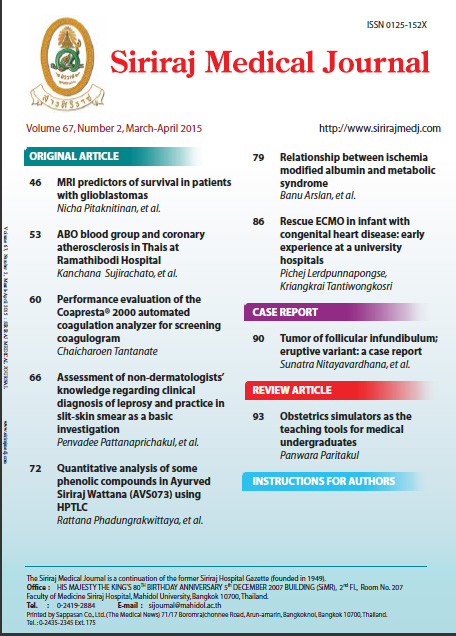Rescue ECMO in Infant with Congenital Heart Disease: Early Experience at a University Hospitals
Abstract
Background: Extracorporeal membrane oxygenator (ECMO) is one of challenging mechanical support devices that can increase a chance of survival in infant patients who undergo complicated congenital cardiac surgery, but cannot be separated from cardiopulmonary bypass. ECMO also rescues cardiac arrest patients after cardiac intervention or from other reasons. We would like to show our outcome in early experience.
Methods: We retrospectively reviewed our medical records of all infant patients supported with ECMO after they underwent cardiac procedures between January 2011 and December 2013. Their demographic data, diagnosis, procedure variables, ECMO indication and duration, blood product administration, circuit-related complication, ICU length of stay, intubation period time, and perioperative outcome were analyzed.
Results: There were six patients (Male = 5, Female = 1) with congenital heart disease who received ECMO following cardiac intervention (n=2) or cardiac surgery (n=4). Four patients with post-cardiac surgery had a mean cardiopulmonary bypass time of 347.25 minutes (SD= 132.10, range 235-530 minutes) and a mean aortic cross-clamp time of 90.75minutes (SD=47.74, range 52-159 minutes). The median age of ECMO induction was 32 days (range 1-182 days) and the mean weight of patients at ECMO induction was 3.15 kg (SD=0.67, range 2.5-4.3 kg). All patients received venoarterial type of ECMO support. The reasons for rescue ECMO were post-cardiac arrest (n=1), inability to wean from cardiopulmonary bypass (n=3), pulmonary hypertension (n=1), and cardiogenic shock (n=1). Five of them were successfully weaned from ECMO. Overall Survival in this group was 50% (3 out of 6 patients). Sepsis, cardiomyopathy and pulmonary hypertension were causes of death.
Conclusion: ECMO is an efficacious method for rescuing some infant patients who undergo complex congenital heart surgery or cardiac intervention with critical unstable status or post-cardiac arrest.
Keywords: ECMO, congenital heart disease, infant
Downloads
Published
How to Cite
Issue
Section
License
Authors who publish with this journal agree to the following conditions:
Copyright Transfer
In submitting a manuscript, the authors acknowledge that the work will become the copyrighted property of Siriraj Medical Journal upon publication.
License
Articles are licensed under a Creative Commons Attribution-NonCommercial-NoDerivatives 4.0 International License (CC BY-NC-ND 4.0). This license allows for the sharing of the work for non-commercial purposes with proper attribution to the authors and the journal. However, it does not permit modifications or the creation of derivative works.
Sharing and Access
Authors are encouraged to share their article on their personal or institutional websites and through other non-commercial platforms. Doing so can increase readership and citations.










